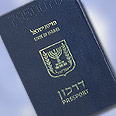
I am Israeli
Uzzi Ornan tries to understand why Ministry of Interior is willing to recognize dozens of nationalities, but not Israeli one
Most countries have citizens who categorize themselves not only according to their country of origin, but by ethnic, religious or cultural affiliation as well; however, all are considered to be of the same nationality, and the authorities make it a point not to list any other affiliation in any official document.
Imagine the uproar amongst the Jewish communities in the US or France, if the authorities tried to list "Jewish" or "Christian" in any official document.
Israel's Declaration of Independence too states that all of Israel's citizens are of one nationality, which is, according to it – Israeli. Israel, says the Declaration of Independence, will be "be based on freedom, justice and peace as envisaged by the prophets of Israel; it will ensure complete equality of social and political rights to all its inhabitants irrespective of religion, race or sex; it will guarantee freedom of religion, conscience, language, education and culture."
The declaration omits the term "nationality," proving that when envisioned, the Declaration of Independence saw all citizens as the children of one state and one nationality. And still, the Ministry of Interior insists on holding on to an age-old Ottoman tradition and divides Israelis into ethnic and religious sub-categories, which it dubbed "nationalities": Jews, Arabs, Druze, Circassians, Assyrian Samaritans, etc.
New Israeli citizens are listed by the ministry as belonging to their original homeland. The "nationality" clause in new citizens' passports still reads "Spanish," "French" or "Singaporean." The Ministry of Interior has over 120 nationality listings, but should a new citizen be Jewish, regardless of his origin, he will be noted as such. Nationality then, according to the ministry, can indicate both your religion – "ethnic nationality" – and your origin.
The makings of a recognizable nationality
Out of its 120 nationalities, the Ministry of Interior fails to recognize just one relevant one – the Israeli nationality – despite the fact that other countries around the world most certainly do. To them, the citizens of Israel are of Israeli Nationality – it is as simple as that.
Segmentation according to ethnic nationality serves only to deepen Israeli society, as it serves as a backdrop for discrimination. Flash your ID card and whatever government clerk sitting across from you immediately knows which "clan" you belong to, and can refer you to those best suited to "handle your kind."
Behind the usual "security considerations" lies the Jewish nationality's aspiration to separate itself from anyone who has not undergone an Orthodox conversion. Some Israelis, however, are more than willing to open the Israeli nation to anyone wishing to join it, no questions asked. It is inconceivable that a country, which recognized dozens of different nationalities, refuse to recognize the one nationality it is suppose to represent.
In order to allow Israelis who wish to be known as just that – Israelis, with no religious or ethnic denomination – the Ani Israeli ("I am Israeli") Association filed a motion with the Jerusalem District Court, asking it to order the Ministry of Interior to list the petitioners as "Israelis" in all official documents.
The judge rejected the petition, claiming in his ruling that he "cannot create a new nationality via court order," and further ruling the matter "non-justiciable." The former is, of course, not true, since the Declaration of Independence created the Israeli nationality, leaving it up to no court to create.
The Ani Israeli Association is currently working on a High Court appeal of the ruling.
Prof. Uzzi Ornan is an Israeli linguist, a member of the Academy of the Hebrew Language and the chairman of the Ani Israeli Association










